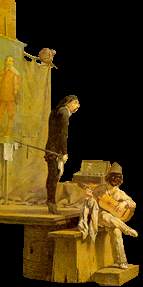 |
 |
 |
 |
 |
|
| A Cinema of Contemplation |  |
|
The Films of Theo Angelopoulos: A Cinema of Contemplation is a fascinating glimpse into the mind of an intelligent, compassionate, and devotedly Hellenic filmmaker. At the core of Angelopoulos' films lies an emotional honesty and profound sorrow for the increasing dissolution of the Greek village - the neglected rural area that Andrew Horton calls the "other Greece". For Angelopoulos, to portray Greece beyond the modern, cosmopolitan city of Athens is to represent the true soul of the Greek people: to capture, with an underlying sense of desperate urgency and reverent nostalgia, the rapidly vanishing customs, Orthodox religion, and traditional family that define their cultural identity.
"The village is a complete world in miniature. The old Greek villages had a spirit, a life, full of work and play and festivity. Of course, Greek villages began to depopulate by the turn of the century, but it was really World War II and the subsequent civil war in Greece that completely destroyed the reality and concept of the Greek village. Our whole way of life was changed by these two catastrophes.
Of course villages would have changed anyway. But not so drastically. The changes would have been made in a much more gradual and gentle way. You have to understand that part of the result of these wars was that in the 1950s over 500,000 village men went to Germany in particular, but also America and Australia, etc., to become guest workers. That meant a big shift in village life. Suddenly the men were gone and the women remained. With all these changes, the spirit of the villages began to die."
It is this rootlessness, migration, and transience that is reflected in Angelopoulos's early films: Reconstruction, The Travelling Players, Voyage to Cythera, and Landscape in the Mist. Horton further proposes that Angelopoulos finds a sense of kinship and personal responsibility with the Balkan states because of their shared cultural history of Turkish occupation, and it is this empathy that compels him to capture the tragedy of the Balkan crisis, as illustrated in his latter films: The Suspended Step of the Stork, Ulysses' Gaze, and Eternity and a Day.
"It is a very difficult time for artists of all kinds and writers of course too in the Balkans today. Nobody wants to listen. Nobody. With the killing, the wars, the struggles, troubles, no one can listen, and art, true art, demands listening. So, in the midst of all of this, what am I to do? Simply, I can make films for those who do appreciate my work."
Greek literature proves to be an integral aspect of Angelopoulos' narrative. Ulysses' Gaze, as the title suggests, is inevitably, the story of a filmmaker's personal odyssey to find meaning in his life and reconnect with his cultural past. In The Travelling Players, the actors remain distant and inscrutible, and it is their name association to the characters in the Aeschylus Oresteia trilogy that will provide clues to, if not predestine, their ultimate course of action in the film. Moreover, Telemachus' search for his father, Odysseus, becomes a recurring subject in Angelopoulos' films: the children, Voula and Alexander, searching for their unknown father beyond the German border in Landscape in the Mist; the director searching for an actor to cast as the father for an autobiographical film in Voyage to Cythera; and the lost Albanian boy in Eternity and a Day.
Andrew Horton presents a reverent, insightful, and intelligent analysis of Angelopoulos' body of work. By citing the filmmaker's influences from Greek literature and mythology, as well as the personal relevance of specific scenes and events in Angelopoulos' own life experience, Horton demystifies the idea that Angelopoulos' films are impenetrable, distant, and abstruse. Rather, what Horton reveals is a compassionate examination of a proud Greek national who seeks to capture and preserve his dying cultural heritage; a conscientious activist who understands the overreaching and devastating toll of war and divisive politics; and a sincere humanist who strives to break down artificial borders and "counterbalance the fragmentation of our world".
by Andrew Horton
|
|
|
|
